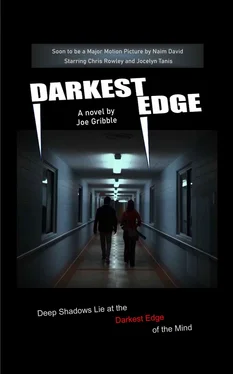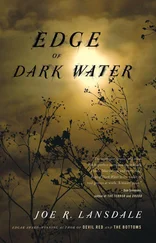Joe Gribble - Darkest Edge
Здесь есть возможность читать онлайн «Joe Gribble - Darkest Edge» весь текст электронной книги совершенно бесплатно (целиком полную версию без сокращений). В некоторых случаях можно слушать аудио, скачать через торрент в формате fb2 и присутствует краткое содержание. Год выпуска: 2020, ISBN: 2020, Жанр: Триллер, на английском языке. Описание произведения, (предисловие) а так же отзывы посетителей доступны на портале библиотеки ЛибКат.
- Название:Darkest Edge
- Автор:
- Жанр:
- Год:2020
- ISBN:979-8600247475
- Рейтинг книги:3 / 5. Голосов: 1
-
Избранное:Добавить в избранное
- Отзывы:
-
Ваша оценка:
- 60
- 1
- 2
- 3
- 4
- 5
Darkest Edge: краткое содержание, описание и аннотация
Предлагаем к чтению аннотацию, описание, краткое содержание или предисловие (зависит от того, что написал сам автор книги «Darkest Edge»). Если вы не нашли необходимую информацию о книге — напишите в комментариях, мы постараемся отыскать её.
Darkest Edge is a psychological thriller about an alcoholic, suicidal TV reporter investigating the staff at a notorious mental hospital. While there, he discovers he may have once been a patient. He finally uncovers the truth – and it changes his life forever.
Darkest Edge — читать онлайн бесплатно полную книгу (весь текст) целиком
Ниже представлен текст книги, разбитый по страницам. Система сохранения места последней прочитанной страницы, позволяет с удобством читать онлайн бесплатно книгу «Darkest Edge», без необходимости каждый раз заново искать на чём Вы остановились. Поставьте закладку, и сможете в любой момент перейти на страницу, на которой закончили чтение.
Интервал:
Закладка:
DARKEST EDGE
by
Joe Gribble
Preface
When I decided to write a story about an insane asylum, I became interested in the history of the amazing architecture that is often seen on these old campuses. My research into the building design led to a better understanding of the history of the treatment of the mentally ill in the United States. This short summary sets the stage for the overall story.
Asylum — ‘Protection’ and ‘shelter’ aren’t the first words that usually come to mind, certainly not when preceded by ‘Lunatic’ (as in Lunatic Asylum). Prior to the tireless efforts of Ms. Dorothea Dix in the mid-1800s, most mentally challenged people were dependent on the charity of others for their well-being. Some took advantage of almshouses run by various religious organizations, others fended for themselves. Ms. Dix’s efforts, and the determination by the federal government that treatment of the insane was a responsibility of the individual states, resulted in the development of institutional care facilities within the states. The facilities built by the states were variously known as ‘lunatic asylums’, ‘hospitals for the insane’, or eventually as ‘state hospitals’.
Thomas Kirkbride, a psychiatrist, developed a model of treatment that included ensuring the patients received lots of sunlight, fresh air, privacy and comfort. Kirkbride’s designs were institutional, usually with an imposing entry and staggered, multi-story wings to house the patients.
Throughout the late 1800s and early 1900s, the states continued to provide for the care of mental patients. Institutional facilities continued to be built and patient levels grew and grew, until in the mid-1950s over half a million patients were incarcerated in institutions.
The intent was admirable, but over time many of the hospitals became underfunded, overcrowded, and their patients became ripe for abuse. In the mid-1900s, the convergence of new drug treatments, recognition of patient overcrowding and abuse, and state government reluctance to continue to fund the hospitals resulted in a movement to reduce long-term psychiatric care within large institutions and push the care back into the communities.
If you are interested in learning more, there are several good sources of information on these topics. Zeb Larson’s “America’s Long-Suffering Mental Health System” (April 2018) is a great read (https://origins.osu.edu/article/americas-long-suffering-mental-health-system/page/0/1)
Mark Ruffalo’s “The American Mental Asylum: A Remnant of History” is also a good source of information (https://www.psychologytoday.com/us/blog/freud-fluoxetine/201807/the-american-mental-asylum-remnant-history).
Finally, ‘The Asylum Projects’ contains a continuously updated review of the many amazing asylum facilities (both existing and historical) across the world: https://www.asylumprojects.org/index.php/Main_Page.
Acknowledgements
I’m thoroughly grateful to my wife, Nedra, for not sending me to Wayne Ave (though I’m sure it crossed her mind more than once). Wayne Ave, I found out, is the term local folks use when referring to the Dayton State Hospital (originally known as the Southern Ohio Lunatic Asylum). Seriously, Nedra is the most supportive and loving wife a man could ever ask for.
Cindy Dodson was kind enough to edit the manuscript. She did a thoroughly wonderful job, and any errors you may find are a result of me ignoring her suggestions.
Finally, I owe a debt of gratitude to Naim David and William Chaffin. William had enough confidence that this story would make a great movie that he agreed to produce it. Naim has been a wonderful director, and truly took these words and created a fantastic feature film.
Signed copies of the film on DVD, signed film posters, and signed copies of this book are available at https://3genfilms.storenvy.com/.
To follow our movie development or leave comments on this story, please visit us on facebook at https://www.facebook.com/DarkestEdgeFilm/
DARKEST EDGE
Jackie Wilcox sat curled up on her worn out sofa. The Jerry Springer show played on the TV in the background, but she didn’t pay it much attention. She lit another cigarette, and pulled her legs up under her.
Her cat, a skinny little calico, meowed as it brushed against the edge of the sofa.
“You’ll be okay, Maddie,” Jackie said, reaching down to pet her cat.
The cat didn’t seem to notice as it limped slowly toward the front door. Once there, it lay down near the pile of letters and bills that had accumulated below the old-fashioned mail slot.
Jackie watched her only friend curl up on the floor. Maddie had been the only thing keeping her going the last few months, and Jackie wondered how long that would last. Jackie grimaced in pain as she reached over to the end table and poured what was left of the vodka into the well-used glass. She set the empty bottle down next to the half-full prescription bottle and the stack of unopened letters, then took the glass and sipped from it. She held the glass in front of her eyes, stared at the warming elixir, then hungrily gulped the rest down.
Jackie had seen better days. At only thirty-seven, she wondered again how life could have screwed her over so often. And so completely.
Her thoughts drifted to her past. Even as a child, her life had been a challenge. Her parents died when she was young, and living in ‘the home’ had been a special kind of hell. Her only fond memories were of her brother, Mark. At one year her junior, she had tried to protect him from the evils at the home, and from the horrible memories that preceded their internment there. Mark. How long had it been? Two years since she had seen him? Talked to him?
Even after getting out of the home, life had not been much kinder. She worked as a maid in one of the worst hotels in the city. It was a disgusting thing to do, cleaning up after the addicts and drunks who rented rooms by the day to sleep off their binges. That went on for a couple of years, enough time to make sure Mark got out of the home and could make it on his own. Once he was out, Jackie took a job as an aide in a state-run nursing home. That was much better money, though hardly enough to build a nest egg — and the work was just as bad. Fifteen years.
As bad as the nursing home job was, she would have kept doing the work just to keep some little bit of money coming in, but the wreck put a stop to that. Drunk driver. Slammed into her broadside. In the hospital for two months. Hip crushed, face slashed. Mark had come to see her then. That was a bright spot. But then he stopped visiting again. He had told her he was having trouble at home. That’s why he didn’t come see her often. It was just a five-hour drive — he should have come more often. She wanted to hate him for not coming to see her. But she couldn’t. He was all she had to connect her to this world.
Mark had confided that he was having a bit of trouble with booze. Wasn’t an alcoholic, he said, just that his wife didn’t like how much he drank.
Jackie looked at her own empty bottle. She picked it up and tried to coax a bit more out of it. Just a drop tumbled out and into the glass. She picked up the glass and slammed it back, as if it were a full shot. She held the glass up, waiting for that last drop to make its slow trek down the edge of the glass and onto her tongue. She closed her eyes, savoring it. Finally, she opened her eyes and put the glass back down on the table, next to the envelopes.
She picked up one of the envelopes, turned it over to see the bold, red letters. PAST DUE. She tossed it back onto the pile with the rest. “Can’t get blood out of a stone,” she told the envelope.
Читать дальшеИнтервал:
Закладка:
Похожие книги на «Darkest Edge»
Представляем Вашему вниманию похожие книги на «Darkest Edge» списком для выбора. Мы отобрали схожую по названию и смыслу литературу в надежде предоставить читателям больше вариантов отыскать новые, интересные, ещё непрочитанные произведения.
Обсуждение, отзывы о книге «Darkest Edge» и просто собственные мнения читателей. Оставьте ваши комментарии, напишите, что Вы думаете о произведении, его смысле или главных героях. Укажите что конкретно понравилось, а что нет, и почему Вы так считаете.












